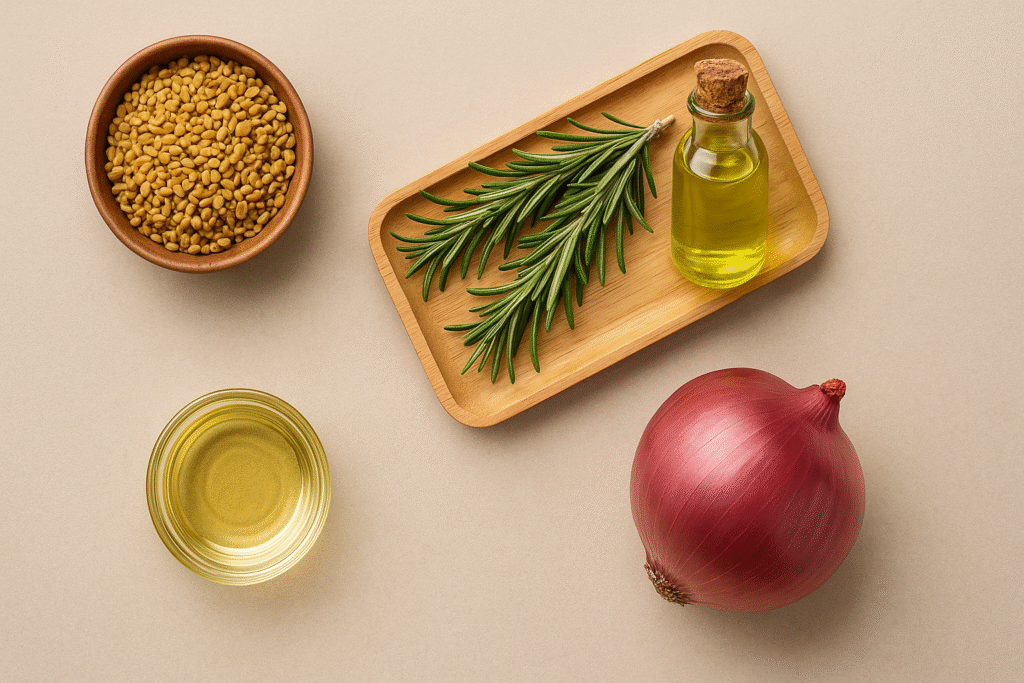
1) A smarter way to choose growth oils
Hair growth advice is everywhere, yet most tips skip the real decider of results: your scalp type. Oily, dry, and sensitive scalps respond differently to the same formula, so copying a viral routine often leads to buildup or irritation instead of thicker-looking lengths.
In this guide, we compare fenugreek oil, rosemary oil, and onion oil through the lens of scalp needs. You’ll get clear routines, application tips, and blend ideas so you can stop guessing and start seeing steady, sustainable progress.
2) What each oil brings to the table
Fenugreek oil is beloved for its soothing, slip-enhancing feel during massage. As a pre-wash treatment, it helps reduce friction on the scalp and at the roots, which can make hair look fuller over time. Moreover, it plays well with lightweight carriers when you want benefits without residue.
Rosemary oil shines when you want an invigorating massage step. It’s typically used in tiny amounts and tends to feel brisk on the scalp, which helps you avoid over-application. Meanwhile, onion oil is a traditional favorite for stronger-looking strands, though its pungent scent means technique and timing matter more than with the other two.
3) For oily, quickly weighed-down scalps
If your roots look slick by midday, you need slip without film. Start with rosemary oil diluted in a light carrier like squalane or grapeseed. Apply a few drops to your fingertips, then massage for two to three minutes before shampooing. This targeted, pre-wash use keeps sebum in check while still delivering a stimulating step.
Fenugreek oil can also work, but keep it ultra-light: think one to two drops in a palmful of watery leave-in or a quick pre-wash. As for onion oil, reserve it for occasional use and always shampoo afterward. Otherwise, the scent and richness can linger on an oily scalp.
4) For dry, tight, or flaky scalps
Dry scalps crave cushion. Here, fenugreek oil in a nourishing carrier like jojoba or sweet almond can make pre-wash massage more comfortable and reduce that tight, stretched feeling after rinsing. Use it once or twice weekly and give yourself a slow, circular massage to boost comfort.
Onion oil can join the rotation as a once-weekly pre-wash to support stronger-feeling strands from root to tip. However, cap the contact time at 20 to 30 minutes, then shampoo thoroughly. Rosemary oil remains helpful, but blend it sparingly into richer carriers to avoid astringency.
5) For sensitive or reactive scalps
Sensitivity changes the rules. Patch-test every formula behind the ear or along the hairline for several days before full use. When you proceed, choose the simplest blends first: fenugreek oil diluted in jojoba or squalane is often the gentlest starting point.
If rosemary tingles too much, lower the concentration or apply only to non-irritated areas. With onion oil, go slowest of all. Start with a tiny, short pre-wash window and rinse thoroughly. If redness, itching, or heat persists, discontinue and switch to a calmer routine.
6) If itch or dandruff keeps returning
Recurring itch or flakes can stem from buildup, not just dryness. First, simplify. Use a chelating or clarifying shampoo once every one to two weeks to reset the scalp. Then reintroduce oils in small, pre-wash doses so nothing lingers overnight on the skin.
Fenugreek oil pairs well with a weekly clarify-and-condition cycle because it’s easy to rinse when diluted. Meanwhile, rosemary oil’s brisk feel makes it a good fit for short massages you’ll wash off. Onion oil can still be used, but keep it occasional and always follow with a thorough cleanse.
7) Carriers, finishes, and preventing buildup
Your carrier decides whether a great active becomes a greasy film. For oily or fine hair, reach for squalane or grapeseed. For normal to dry scalps, jojoba, sweet almond, or a light fractionated coconut can add cushion without heaviness. Always measure your drops and track how your scalp feels 24 hours later.
For lengths and ends, switch roles and think finish. Apply a whisper of camellia pure oil after styling to tame frizz and add gloss without weight. It’s silky, spreads fast, and won’t compete with your scalp formula. This division of labor keeps roots fresh and ends sleek.
8) DIY micro-recipes and patch testing
Create a simple “Scalp-Light” blend for oily types: 1 teaspoon squalane + 2 drops rosemary + 2 drops fenugreek oil. Massage pre-wash for two minutes, then shampoo. For dry scalps, try “Scalp-Cushion”: 1 teaspoon jojoba + 3 drops fenugreek oil + 1 drop rosemary. Leave on 20 minutes before cleansing.
If you want to bring onion oil into the picture, use a “Once-a-Week Boost”: 1 teaspoon sweet almond + 1 drop onion oil + 1 drop rosemary. Keep contact under 30 minutes and follow with a thorough wash. Patch-test each formula for several days before regular use, and record notes in a simple log.
9) A weekly schedule that actually sticks
Consistency beats intensity. Start with two pre-wash massages weekly and one clarifying wash every other week. On off days, skip scalp oils and just finish mids and ends with a dot of camellia pure oil to maintain shine.
Track three signals: scalp comfort at 24 hours, root volume on day two, and shedding in your brush after detangling. If any metric trends the wrong way for two weeks, reduce frequency, lighten the carrier, or shorten contact time.
10) When to blend, rotate, or take a break
Blends make sense when your scalp has mixed signals. For example, pair a tiny amount of rosemary with fenugreek oil to keep stimulation while softening the feel. Rotate onion oil in once weekly if you want a stronger-feeling routine, then step back to fenugreek-led sessions for maintenance.
Take a full week off oils if your scalp feels hot, tender, or unusually itchy. Use a gentle shampoo, a hydrating conditioner, and a minimal finishing touch on your ends. After symptoms settle, reintroduce the lightest routine first and rebuild slowly.
11) Final call: winners by scalp type
For oily or easily weighed-down scalps, rosemary in a light carrier tends to “win” because it’s easy to control and rinse. Fenugreek oil comes in second when used sparingly and pre-wash. Onion oil stays occasional to avoid lingering scent and weight.
For dry or tight scalps, fenugreek oil often leads thanks to its cushioning feel, with onion oil as a strategic weekly boost. Rosemary still plays a role, but in lower doses. And for sensitive scalps, start gentle with fenugreek oil, test rosemary carefully, and treat onion oil as an optional, short-contact step.





